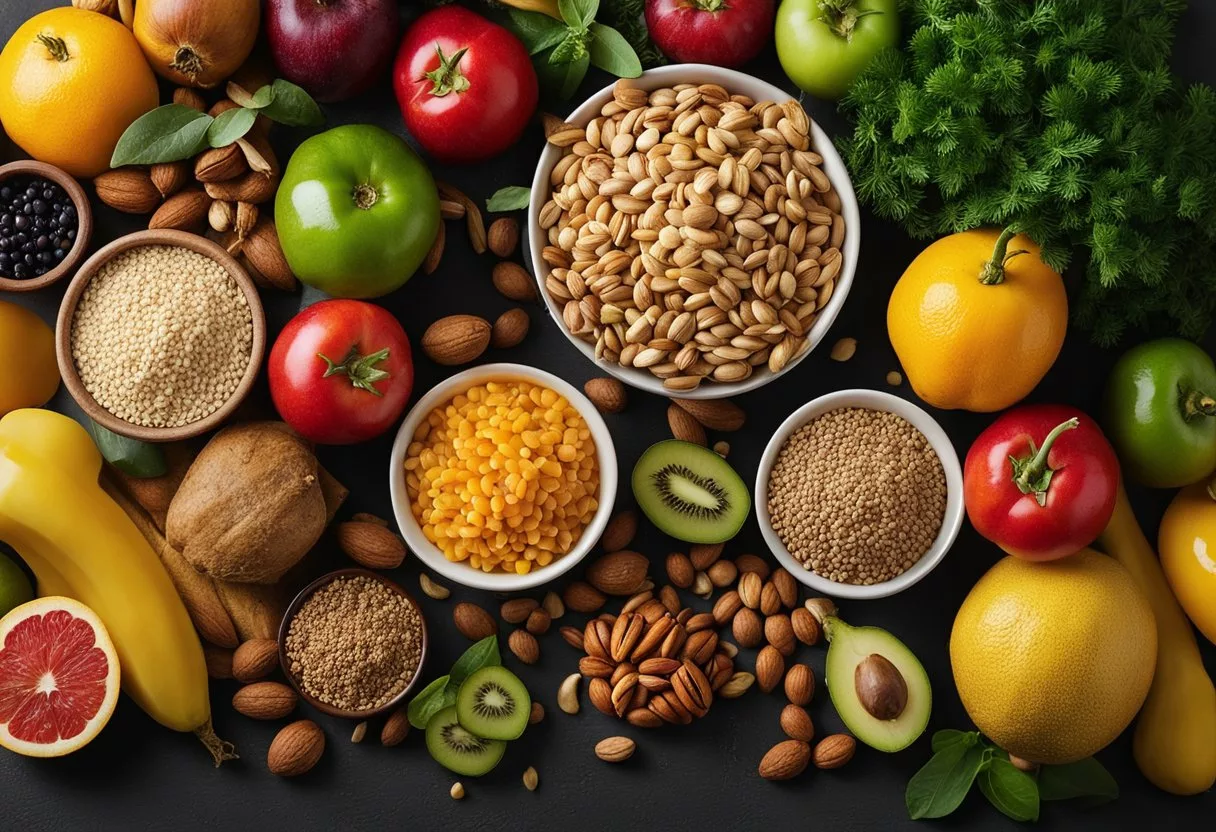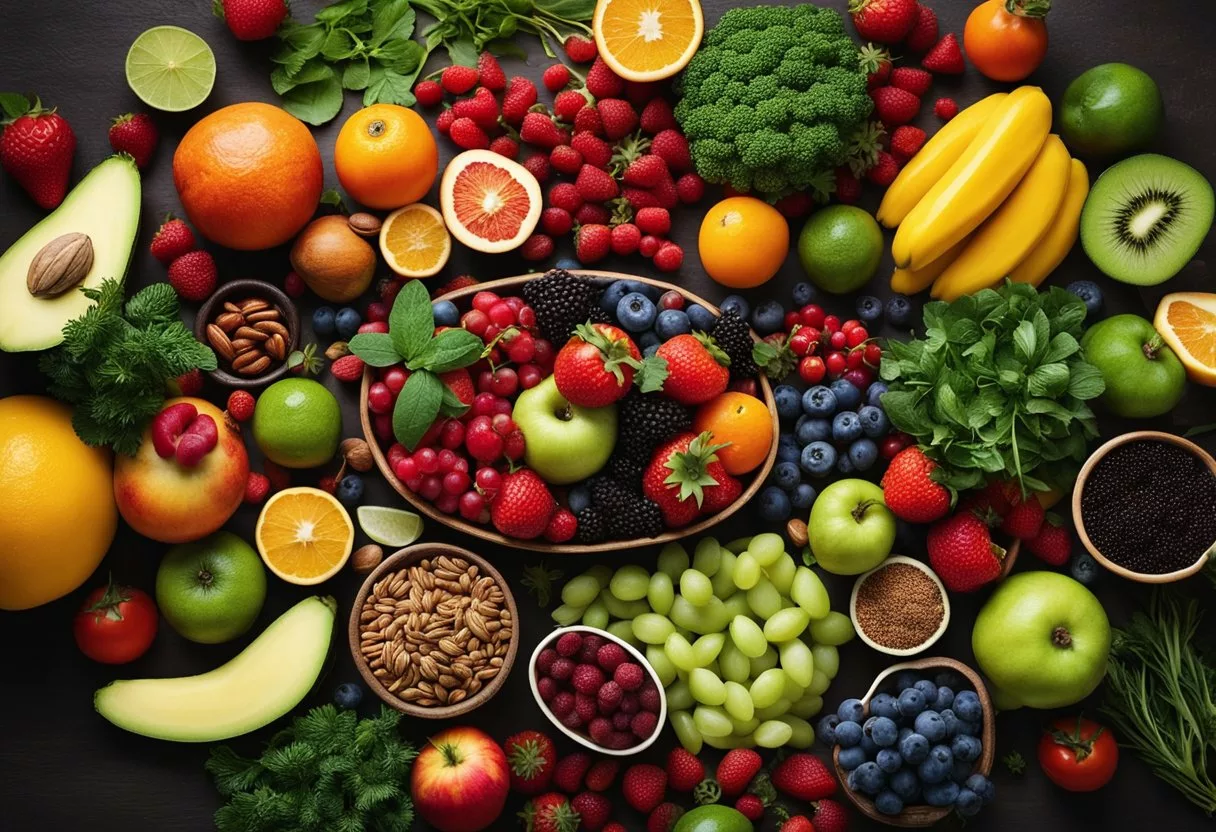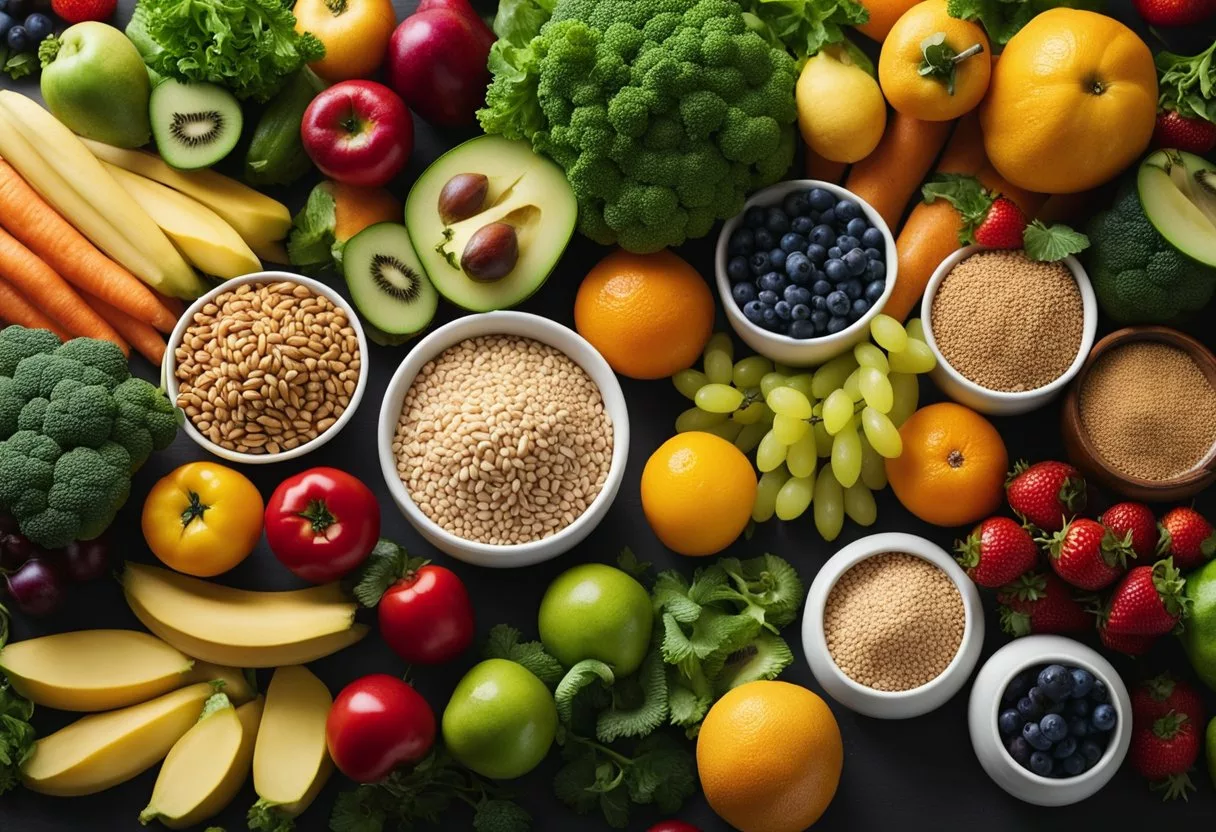An anti-inflammatory diet for inflammatory bowel disease (IBD) is formulated to minimize the inflammation that characterizes conditions such as Crohn’s disease and ulcerative colitis.
Through careful selection of foods, individuals with IBD aim to support a balanced gut microbiome and mitigate the gastrointestinal distress associated with these chronic conditions.
This diet typically includes foods that are high in probiotics and prebiotics, while reducing intake of inflammation-inducing ingredients.

With no cure for IBD currently available, managing symptoms through dietary choices offers a complementary approach to traditional medical treatments.
The anti-inflammatory diet for IBD is not one-size-fits-all but rather a personalized nutrition plan that focuses on foods shown to help with the reduction of gut inflammation.
Foods such as lactose, wheat, refined sugars, and certain carbohydrates are typically reduced, as they may exacerbate inflammation and disturb the gut flora balance.
Key Takeaways
- An anti-inflammatory diet aims to reduce IBD symptoms by fostering a healthy gut microbiome.
- It’s a personalized diet that cuts down on foods known to trigger inflammation in IBD patients.
- This dietary approach is complementary to medication and not a replacement for professional medical treatment.
What is IBD?
For more complete information about IBD diagnosis, treatment and prevention go here.
Inflammatory Bowel Disease, or IBD, is a complex condition that impacts the digestive tract, characterized by chronic inflammation. This section delves into its definition, symptomatology, distinctions between its major types, genetic implications, and the relationship with the immune system.
Defining Inflammatory Bowel Disease
Inflammatory Bowel Disease (IBD) refers to disorders involving chronic inflammation of the gastrointestinal tract.
Two primary types of IBD are Crohn’s Disease and Ulcerative Colitis, both of which bring unique challenges and symptoms but share common inflammatory pathways.
Symptoms of IBD
Common IBD symptoms include persistent diarrhea, abdominal pain, rectal bleeding, fatigue, and weight loss.
The intensity of these symptoms can vary from person to person and often fluctuate between periods of active illness and remission.
Crohn’s Disease Vs. Ulcerative Colitis
Crohn’s Disease can affect any part of the gastrointestinal tract from mouth to anus and is noted for inflammation that may spread through multiple layers of the bowel walls.
Conversely, Ulcerative Colitis typically affects only the colon and rectum, with inflammation occurring only in the innermost lining of the colon.
The Role of Genetics in IBD
Although the exact cause of IBD is not fully understood, genes appear to play a critical role.
Individuals with family members who have IBD are at an elevated risk, indicating a hereditary component.
While no singular gene causes IBD, several genes have been associated with the development of the disease.
IBD and the Immune System
The immune system‘s response is a key element in IBD.
Abnormal immune reactions to environmental triggers, including the intestinal microbiome, are believed to drive the inflammation seen in individuals with IBD, although these pathways are not yet fully elucidated.
Fundamentals of an Anti-Inflammatory Diet

An anti-inflammatory diet for managing inflammatory bowel disease (IBD) centers around the consumption of certain food groups while avoiding others that may trigger inflammation.
Principles of Anti-Inflammatory Eating
A key principle in anti-inflammatory eating is to enhance gut health and reduce inflammation by selecting foods that are loaded with nutrients, fiber, and natural antioxidants.
It involves a strategic intake of probiotics to support a balanced gut microbiota and includes adequate amounts of omega-3 fatty acids which are known to possess anti-inflammatory properties.
This dietary approach is more than a list of foods; it’s a holistic method of eating that supports overall health and wellbeing.
Identifying Anti-Inflammatory Foods
Anti-inflammatory foods typically contain high levels of antioxidants and phytonutrients which can help counteract inflammation.
These foods include:
- Fruits (e.g., berries, oranges)
- Vegetables (e.g., leafy greens, peppers)
- Whole grains (rich in fiber)
- Lean proteins (such as fish and plant-based proteins like beans and lentils)
- Nuts and seeds
- Healthy fats, especially those high in omega-3s (e.g., from oily fish, flaxseeds, and walnuts)
Including these foods doesn’t only manage IBD symptoms but also contributes to overall health by providing essential vitamins, minerals, and other nutrients.
Foods to Avoid in an IBD Diet
Certain foods and ingredients can exacerbate IBD by promoting inflammation within the digestive tract. Individuals with IBD are often advised to avoid or limit:
- Processed foods and refined carbohydrates which may contain additives and high levels of sugar
- Foods high in saturated fat
- Dairy products, especially if lactose intolerant
- Products with high quantities of added sugars and artificial sweeteners
- Alcohol, which can irritate the gut lining
Beneficial Foods for IBD

In managing Inflammatory Bowel Disease (IBD), certain foods can help reduce inflammation and promote gut health.
Including a variety of fruits, vegetables, whole grains, lean proteins, dairy alternatives, and healthy fats in the diet may contribute to better IBD management.
Fruits and Vegetables for IBD
Fruits and vegetables are high in fiber and antioxidants, which can help reduce inflammation.
Those with IBD may find cooked vegetables easier to digest[1], while certain fruits like bananas are not only gentle on the stomach but also nutrient-rich. Berries offer antioxidants that support overall health.
- Recommended Fruits: bananas, melons, cooked apples
- Recommended Vegetables: steamed carrots, spinach, pumpkin
Whole Grains and IBD
Whole grains provide essential nutrients and fiber, which aids in digestion and may reduce IBD symptoms.
It is important to choose grains that are less likely to aggravate the condition, such as oats and brown rice[2].
- Grain Choices: oats, brown rice, quinoa
Lean Proteins and IBD
Lean proteins are an important part of an anti-inflammatory diet for IBD.
Options like chicken, fish, and eggs[3] can provide the necessary protein without contributing to inflammation. Fish rich in omega-3 fatty acids, like salmon, are especially beneficial.
- Proteins to Include: chicken breast, turkey, salmon, eggs
Dairy Alternatives and IBD
Individuals with IBD often find lactose difficult to digest, so dairy alternatives can be a healthier option.
Almond, soy, and oat milks are lactose-free and can be used in place of cow’s milk. Aged cheeses[4] might be better tolerated as they contain less lactose.
- Dairy Substitutes: almond milk, soy milk, oat milk
- Cheeses: cheddar, Swiss, Parmesan
Healthy Fats and IBD
Healthy fats, such as olive oil and avocado, are not only good for the heart but also may help with IBD symptoms by reducing inflammation.
Including nuts and seeds in the diet is another way to consume healthy fats.
Frequently Asked Questions
In this section, readers will find answers to common inquiries regarding the anti-inflammatory diet for IBD. These highlights are backed by research and clinical findings, offering valuable guidance for dietary management.
What foods should be avoided to reduce the risk of inflammation in IBD?
Individuals with IBD are often advised to limit foods that may exacerbate inflammation. These include those high in lactose, wheat, refined sugar, and certain carbohydrates. These foods can disturb the normal gut flora, contributing to IBD symptoms.
Which specific food groups are considered safe and beneficial for IBD patients?
Probiotic and prebiotic foods promote a healthy microbiome. Lean proteins, certain fruits and vegetables, and omega-3 fatty acids are also typically safe and can be beneficial for IBD patients. These food groups help in maintaining a balanced inflammatory response.
How can diet modification help in managing IBD symptoms effectively?
Modifying one’s diet can influence the gut microbiome and intestinal inflammation. Following an IBD Anti-Inflammatory Diet has the potential to create a favorable balance of bacteria in the digestive system. This can lead to symptom management and reduced flare-ups.
Are there recommended meal plans that cater to the needs of those with ulcerative colitis?
Yes, there are meal plans designed to minimize discomfort for those with ulcerative colitis. These plans often incorporate easily digestible foods. They are tailored to individual tolerances and nutritional needs, aiming for well-balanced intake to support gut health.
Can you provide examples of anti-inflammatory foods that are suitable for IBD patients?
Fruits like blueberries, vegetables such as broccoli and spinach, and sources of omega-3s like salmon and flaxseed are examples of anti-inflammatory foods. These can play a role in an IBD-friendly diet by promoting lower levels of inflammation.
What dietary strategies are effective for minimizing flare-ups in IBD?
Adopting a diet lower in pro-inflammatory foods and higher in anti-inflammatory ones is a strategy often recommended for minimizing flare-ups[4] in IBD.
This may include eating smaller, more frequent meals. It also involves keeping a food diary to track and eliminate triggers.
References
- Just a moment.... https://www.crohnscolitisfoundation.org/patientandcaregivers/diet-and-nutrition/special-ibd-diets Accessed November 5, 2025
- I have inflammatory bowel disease (IBD). What should I eat?. https://www.health.harvard.edu/blog/i-have-inflammatory-bowel-disease-ibd-what-should-i-eat-2020051819799 Accessed November 5, 2025
- What Should I Eat? Dietary Recommendations for Patients with Inflammatory Bowel Disease. https://www.ncbi.nlm.nih.gov/pmc/articles/PMC9966256/ Accessed November 5, 2025
- IBD Anti-Inflammatory Diet. https://www.umassmed.edu/nutrition/ibd/ibdaid/ Accessed November 5, 2025
